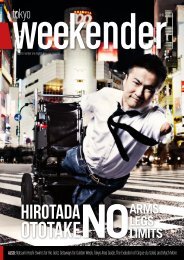Tokyo Weekender July 2016
Breaking the rules of kimono – a new book shatters antiquated views of this traditional garment. Plus: The boys for sale in Shinjuku Ni-chome, best sake of 2017, Japan's new emperor, and what really goes on inside "Terrace House."
Breaking the rules of kimono – a new book shatters antiquated views of this traditional garment. Plus: The boys for sale in Shinjuku Ni-chome, best sake of 2017, Japan's new emperor, and what really goes on inside "Terrace House."
Create successful ePaper yourself
Turn your PDF publications into a flip-book with our unique Google optimized e-Paper software.
All the boys, save<br />
for one, are under 26 (as<br />
dictated by the urisen bars’<br />
rules), and many of them<br />
service clients up to the age<br />
of 80 and even older. They<br />
are paid around ¥7,000 per<br />
hour, and they work from<br />
4pm to midnight or 2am<br />
every day, with just three<br />
days’ holiday per month.<br />
Depending on how many<br />
clients they have, their<br />
monthly earnings vary<br />
between ¥200,000 and<br />
¥1 million – but 50% of<br />
this goes to the bar.<br />
Aside from wondering<br />
why they would choose to<br />
do this kind of work for<br />
such low pay (the reasons<br />
they give range from things<br />
like family debt to losing<br />
everything in the 2011<br />
tsumani), perhaps the most<br />
perplexing detail is that<br />
the majority of the boys<br />
identify as straight; some of<br />
them even have girlfriends.<br />
Even if they do identify<br />
as homosexual, the bar<br />
owners instruct them to<br />
pretend they are straight.<br />
This leads to many a cringeworthy moment<br />
as they describe their struggle to reconcile<br />
their sexuality with the requirements of<br />
their job.<br />
It also raises questions about societal<br />
norms and pressures in Japan. “I think this<br />
scenario of straight-identifying men having<br />
sex for money with clients who are straight<br />
living is a reflection on a society in which it<br />
has traditionally not been an option to live<br />
openly as a homosexual,” says Ash. “I don’t<br />
think that this kind of sex trade is particularly<br />
unique to Japan, but the way in which it<br />
operates is.”<br />
“The things they talk about in the<br />
film are quite specific to the way Japanese<br />
society works,” adds Storey. “For example,<br />
the tendency to be indifferent to issues<br />
that don’t directly affect you. And the lack<br />
of understanding of sexual health issues.<br />
There were interviews where Ian and I<br />
were in tears afterwards. But probably the<br />
most shocking moment for both of us was<br />
when we asked one of the boys if he knew<br />
how an STD is contracted and he said, ‘Can<br />
men get STDs too?’” Considering the type of<br />
work he is doing, where the sex is usually<br />
unprotected, his answer is dumbfounding.<br />
Sexual health education,<br />
or the lack of it<br />
in Japan, is one of the<br />
critical issues raised in<br />
the documentary. In<br />
one scene, the urisens’<br />
manager states that the<br />
boys are given training<br />
about safe sex, but this<br />
is swiftly followed by<br />
several of the urisen<br />
shaking their heads and<br />
saying the opposite. One<br />
tends to believe the boys<br />
on this point, especially<br />
since in a previous scene<br />
the same manager insists<br />
the nature of the job is<br />
explained at interview<br />
stage, while more than<br />
one urisen claims to have<br />
been misled to believe<br />
they would simply be<br />
dining out with clients<br />
or that they would have<br />
female customers as well<br />
as men.<br />
It’s hard enough as<br />
a viewer to walk away<br />
from Boys for Sale without<br />
feeling desperation<br />
for the boys in the film.<br />
So how, after spending so<br />
much time with them, did Ash and Storey<br />
manage to process the experience? And<br />
how has it shaped their views on Japan?<br />
“Everyone talks about how homogenous<br />
Japan is,” says Storey. “But as soon as<br />
you scratch a tiny bit below the surface, you<br />
start to realize that’s not true. Japanese people<br />
are as diverse as everybody else; there<br />
is a dark side, there is all this undercurrent<br />
going on – the same as everywhere else.<br />
By making a documentary about the fringe<br />
of society, you just have it reinforced to<br />
you that all these things are going on here.<br />
Japan is not unique; it’s not a homogenous,<br />
Hello Kitty wonderland ... You have to find<br />
a way of doing what you can and then letting<br />
go. And in some way, making the film<br />
and getting it out there is part of processing<br />
the emotions.”<br />
Ash adds: “It would be a shame if we<br />
walked away and thought ‘I feel sorry for<br />
them, and something like that would never<br />
happen to me.’ I think we have more in<br />
common with people in these situations<br />
than we don’t. We have a lot to learn about<br />
what it means to be human, and to have<br />
empathy. And to not judge people for whatever<br />
choices they’ve had to make.”<br />
Boys for Sale was directed by Itako, and all<br />
illustrations are by N Tani Studio. The film<br />
is being screened this month at LGBT film<br />
festival Outfest in Los Angeles. To watch the<br />
trailer and find out about upcoming screenings,<br />
visit boysforsale.com<br />
38 | JULY 2017 | TOKYO WEEKENDER
















